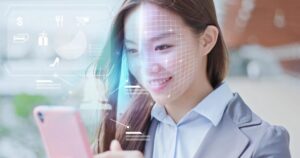
In today’s digital age, online face recognition technology has emerged as a powerful tool that is revolutionizing various industries. One area where its impact is particularly noteworthy is in the field of employment and hiring.
With advancements in artificial intelligence and machine learning, online face recognition is now being utilized by companies to streamline their recruitment processes, enhance security measures, and improve overall operational efficiency.
In this article, we will delve into the ways online face recognition is influencing the company’s processes, specifically in employment and hiring.
- Enhanced Identity Verification
Face recognition software enables companies to verify the identity of job applicants with a high level of accuracy. Traditional identification methods such as presenting ID cards or passports can be prone to forgery or manipulation. By using face recognition algorithms, companies can authenticate the identity of candidates by comparing their facial features against a secure database. This helps prevent identity theft and ensures that the right individuals are hired for the job.
- Efficient Candidate Screening
The traditional process of reviewing numerous resumes and conducting initial interviews can be time-consuming for HR departments. Online face recognition systems offer an efficient solution by analyzing facial expressions, traits, and characteristics to gauge a candidate’s suitability for a specific role. By using predefined criteria, companies can automatically filter and shortlist candidates based on their facial attributes, saving valuable time and resources.
- Bias Reduction in Selection Process
Unconscious bias can often influence the decision-making process during hiring. Online face recognition technology eliminates this bias by focusing solely on an individual’s qualifications and skills, rather than factors such as race, gender, or physical appearance. By removing subjectivity from the hiring process, companies can ensure fair and unbiased evaluations, fostering diversity and inclusion in the workplace.
- Enhanced Security Measures
Security is a top priority for companies, particularly when it comes to protecting sensitive information and assets. Online face recognition systems offer robust security measures by restricting unauthorized access to facilities or sensitive areas within an organization. By integrating face recognition technology into their access control systems, companies can strengthen their security protocols and reduce the risk of breaches or unauthorized entries.
- Improved Employee Time and Attendance Tracking
Online face recognition can also streamline the process of time and attendance tracking. By implementing facial recognition systems, companies can accurately record employee work hours, ensuring accountability and preventing time theft. This automated system eliminates the need for manual timekeeping methods, reduces administrative errors, and improves overall payroll accuracy.
- Personalized User Experience
In customer-centric industries, online face recognition technology allows companies to provide a personalized user experience. By recognizing returning customers’ faces, businesses can offer tailored services, recommendations, or discounts based on their preferences and previous interactions. This not only enhances customer satisfaction but also fosters customer loyalty and repeat business.
- Data-Driven Decision Making
The data collected through online face recognition systems can provide valuable insights for companies. By analyzing facial recognition data, businesses can identify patterns, trends, and customer behaviors, enabling them to make data-driven decisions to improve their products, services, and overall customer experience. This information can also be utilized to optimize internal processes and drive operational efficiency.
- Mitigation of Fraudulent Activities
Fraudulent activities such as identity theft or impersonation can have severe consequences for companies. Online face recognition serves as a powerful deterrent against such activities by authenticating the identity of individuals at various touchpoints. Whether it’s preventing fraudulent job applications or detecting unauthorized access attempts, face recognition technology strengthens the overall security infrastructure of organizations.
- Compliance with Privacy Regulations
As with any technology involving personal data, privacy concerns arise. Companies adopting online face recognition systems must ensure compliance with relevant privacy regulations and obtain consent from individuals whose data is being processed. By implementing proper data protection measures, organizations can instill trust among employees and job applicants, ensuring that their privacy is respected and their information is securely handled.
Conclusion
Online face recognition technology has transformed the employment and hiring processes of companies across various industries. From enhancing identity verification and candidate screening to reducing bias and improving security measures, its impact is far-reaching. By leveraging the power of artificial intelligence and machine learning, organizations can optimize their operational efficiency, make data-driven decisions, and provide a seamless user experience. As technology continues to evolve, companies must stay abreast of the latest advancements in online face recognition to remain competitive in the dynamic landscape of employment and hiring.


























